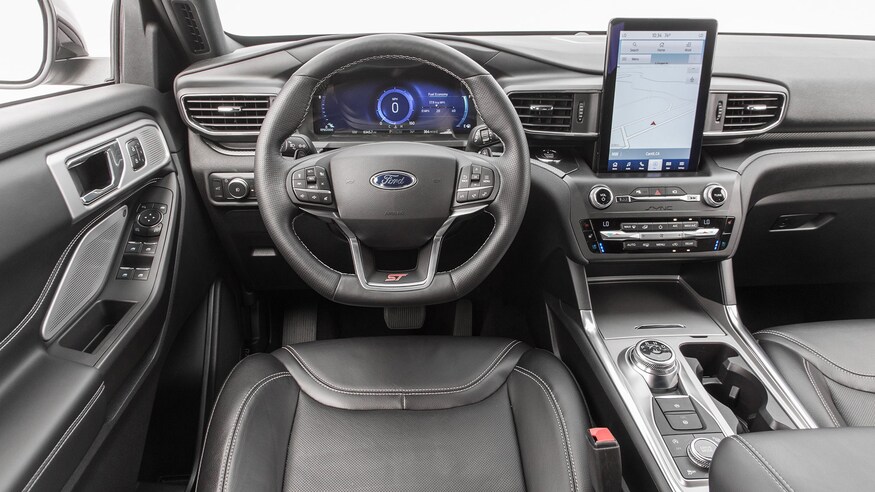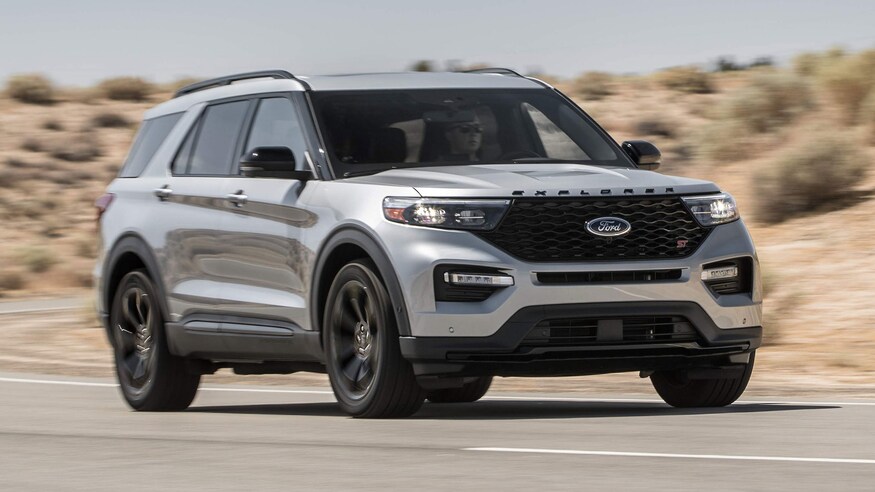Ford Admits Screwing Up the 2020 Explorer Launch, Promises Not to Again
The ol' whoopsie-doo and other learnings from Ford's shareholder kumbaya.
Ford's launch of its latest Explorer three-row crossover was a mess, and Ford brass knows it. That model's woefully slow and problem-plagued launch in Chicago in 2019 won't happen again, per Ford's message to shareholders today during Ford's 65th annual shareholders meeting that also sought to reassure stockholders about the impact of the pandemic.
The meeting was once again held virtually, a practice for the last few years, but one made necessary this year as the world strives to slow the spread of the coronavirus. And while many of the presentations and responses to shareholder questions revolved around the impact of the pandemic that stopped vehicle production around the world, executives also focused on changes made to operations in general for when the industry resumes a degree of normalcy.
Which brings us back to the Explorer and the lessons it holds for the future. A year after its bungled rollout, Ford is still lamenting how it went, the losses it incurred, the blot it put on the company's ability to get vehicles out the door and into customer hands. The learnings are crucial as Ford prepares to launch a new Ford F-150 fullsize pickup truck, including a hybrid version, as well as the new 2021 Ford Bronco and Bronco Sport, a Mustang hybrid and the new 2021 Ford Mustang Mach-E electric crossover.
In the past, we were told some of the problems with the Explorer were because the automaker tried to launch the next-generation SUV with many trim levels, including a hybrid and the Police Interceptor utility vehicle, while simultaneously adding the new luxury Lincoln Aviator sibling which also comes as a plug-in hybrid. It was all being done in an old plant with no room to set up a pilot area to test assembly. Keep in mind, the new Explorer switched from the old SUV's front-wheel-drive-based underpinnings to Ford's new rear-wheel-drive architecture and all the sheetmetal was changed. All this was done while maximizing production of the outgoing Explorer right up to the end.
Ford President and CEO Jim Hackett called it an over-aggressive effort to launch the revamped Explorer and new Lincoln Aviator. He denounced the decision to run pilot builds virtually and says the company has fixed that and will better manage launches now. Ford is also addressing higher warranty costs by reversing past decisions to develop some of its key powertrain components remotely around the world. All these lessons learned will hopefully make Ford stronger when the world regains some normalcy.
Product Delays And Plant Production
In the interim, Hackett said Ford has delayed launches from the original plan but did not specify which vehicles have been affected. Some reveals have already been delayed because of the health crisis, including the new Bronco and Bronco Sport, both of which were to have been shown to media earlier this year. But Ford officials have said key products like the F-150 remain on track.
Oh, and plants were shut down around the world. "We can now see in retrospect our action to close [plants] definitely helped flatten the curve in geographic hot spots," said Hackett, referring to the common phrase for the mitigation of new coronavirus cases. While there are fears of new outbreaks, Ford has returned 90 percent of its salaried staff to work in China and resumed production at all plants in that country, but production is not yet at full capacity. Plants are running again in Europe, too, with a second shift added at the Saarlouis plant in Germany. North American production resumes May 18. "We don't know yet when we will be able to get back to full production," said Chief Operating Officer Jim Farley.
Abysmal Ford Stock Price
Shareholders had a lot of questions about Ford stock that closed at $4.72 on May 13, the night before the annual meeting. Executive Chairman Bill Ford said he feels the company has the right metrics in place for the future and that it is in everyone's interests, including the Ford family, to get the stock prices back up.
According to Hackett before the health crisis, Ford was on track to meet or exceed its original financial guidance. "Never before have we had to close plants in a cascade around the world." The impact was a net loss of $2 billion in the first quarter and Ford is bracing for even worse results in the second quarter.
The automaker must emerge ready to build a brighter future, Hackett said, and the company is working to protect its cycle plan, product plan, launches and technical roadmap with a focus on the long game. In the next two years, Ford will put 40 hybrids and electric vehicles on the road and the China market will get 30 vehicles over the next three years, 10 of them electric. Ford will use its partnerships with Rivian and Mahindra will help accelerate the development of electric vehicles.
Cutting Spending
To preserve cash during this economic crisis, Ford is cutting spending wherever possible to have the financial wherewithal to emerge as a stronger company. Tim Stone, chief financial officer, said Ford has identified billions of dollars in opportunities. It won't be enough to recover from all production losses this year, he said, but Ford is doing what it can to make up for the losses as soon as possible. In the meantime, the company has suspended merit increases, top executives have deferred some of their salaries for at least five months, cost cutting is occurring in areas such as advertising and marketing, and in areas of non-essential spending. Ford has cut its capital spending in half to about a half-billion dollars. The dividend has been suspended and will be restored when Ford is able to strengthen its balance sheet and pay down its lines of credit.
In other business at the annual meeting, 13 people were elected to the board of directors and the perennial request for equal voting rights for each share was turned down with 64.9 percent against. The results are not a surprise, the whole point of the proposal is to give all outstanding stock equal weight. The dual-class share structure gives the Ford family 40 percent control with a small percentage of shares while non-family shares get a single vote each. The request for equality is raised every year and has received more than 51 percent support from non-family shareholders since 2011. But every year the power of the Ford family votes shoots it down. Hackett said the Ford family has been a source of stability during the pandemic.
 Reviewed by Nemanja
on
May 20, 2020
Rating:
Reviewed by Nemanja
on
May 20, 2020
Rating:











